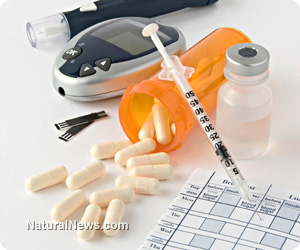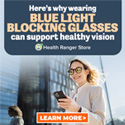
Vitamin D deficiency may signifcantly contribute to type-1 diabetes risk: Research
Monday, August 12, 2013 by: David Gutierrez, staff writer
Tags: diabetes, vitamin D, deficiency
- Newly released JFK files reveal Pentagon's role in creating Lyme disease and covid in the same lab
- Trump's greatest betrayal so far: Accelerating Middle East wars, silencing dissent, and serving Zionist masters
- Trump nominates VACCINE ZEALOT Susan Monarez to lead the CDC, sidelining RFK Jr.'s reform efforts
- The hidden dangers in your kitchen: How cooking methods impact diabetes, cancer and aging
- STARDUST, a secretive Israeli-US startup, plans risky solar geoengineering experiment to BLOCK OUT THE SUN
- DEADLY DECEPTION: How COVID vaccines increased mortality rates and why authorities hid the truth
- CDC finally halts $11 billion COVID funding scam as health officials admit the ‘pandemic’ was a fraud
- Arkansas embraces medical freedom with landmark ivermectin law
- Home gardening for preppers: A beginner's guide to growing your own food
- Lab leak confirmed? Boris Johnson's stunning reversal on COVID origins sparks global debate
- Analysis: The coming economic collapse, a mass uprising and Trump's three secret weapons to halt the growing revolt
- The forgotten hormone hero: How vitamin C quietly balances mood, stress and reproductive health
- Festive flavors: The sweet history, nutritional profile and health benefits of pecan pie
- Elon Musk: Aliens could be here on Earth RIGHT NOW
- Dr. Mike Yeadon releases 15-minute testimony - WATCH - about genocidal intent of COVID “vaccines”
- YouTube’s double standard: CEO defends censorship while claiming free speech champion status
- California's social media censorship law struck down: A victory for free speech or a threat to online safety?
- Sugarcane extract superior to cholesterol-lowering drugs?
- Newly released JFK files reveal Pentagon's role in creating Lyme disease and covid in the same lab
- Elon Musk: Aliens could be here on Earth RIGHT NOW
- Reclaim your health: How midlife exercise reverses years of inactivity
- Trump reverses course on Gaza plan, says “nobody is expelling Palestinians”
- EPA advisor admits the agency is funneling billions to climate groups ahead of Trump’s return to White House
- Big Pharma's $8 Billion bribery scheme exposed: how doctors are pushed to prescribe junk science, not heal
- Space war brewing? Russia threatens to destroy Starlink satellites
- A lack of integrity in Academia: Harvard professor found GUILTY of fraudulent research to promote CRT theory
- Survival 101: Effective EMF blocking techniques
- Rep. Nancy Mace introduces bill to ban biological males from female facilities on federal property
- Mike Adams Sermon 66: God will DESTROY ISRAEL for its wickedness
- Pilots report mysterious lights 'moving at extreme speeds' across Oregon skies
- 5 Simple steps to boost your brainpower: How to strengthen executive function in a distracted world
- Historian warns Israel may be entering an “IRREMEDIABLE DECLINE”
- Florida takes a stand: DeSantis proposes permanent ban on mRNA vaccine mandates
- RFK Jr.'s SSRI antidepressant investigation sparks liberal meltdown, exposes Big Pharma's dangerous game
- OpenAI whistleblower who dissented against how the company trained ChatGPT found dead
- Sugarcane extract superior to cholesterol-lowering drugs?
- EPA advisor admits the agency is funneling billions to climate groups ahead of Trump’s return to White House
- The Health Ranger releases “Vaccine Zombie” song and music video, using AI-animated zombies for the music video
- California's social media censorship law struck down: A victory for free speech or a threat to online safety?
- Dr. Mike Yeadon releases 15-minute testimony - WATCH - about genocidal intent of COVID “vaccines”
- The pandemic as a tool for INDOCTRINATION: Understanding “The Indoctrinated Brain” by Dr. Michael Nehls
- Mike Adams releases country western hit single: Goin’ Back in Time is Comin’ Home
- Mike Adams releases music poetry sensation: A Child of God
- RFK Jr. clears key hurdle: Sen. Susan Collins backs controversial HHS nominee, signaling a new era for health policy
- Florida takes a stand: DeSantis proposes permanent ban on mRNA vaccine mandates
- Unpacking the Lies That We’ve Been Fed – new song and music video released by Mike Adams, the Health Ranger
- Mike Adams releases new song and music video: Nothing More Disgusting Than a Globalist
- Congratulations to the FULLY UNVACCINATED as you resisted the COVID-19 PROPAGANDA MACHINE fueled by over $100 BILLION
- “Why we influenced the 2020 elections”: Facebook files reveal the coordinated effort to bury the Hunter Biden laptop story
- Michigan sheriff announces criminal investigation into 2020 election crimes, Dominion Voting Systems
- Israeli soldiers accused of even more torture and abuse in the West Bank
- Migrants are taking advantage of recent hurricanes to scam residents and loot their homes
- House Intelligence Committee calls for the ARREST and PROSECUTION of Dr. Anthony Fauci
- Peter Rost exposes Big Pharma corruption in his book “The Whistleblower: Confessions of a Healthcare Hitman”
- Red Cross issues warning to stop blood plasma donations from vaccinated people
- Scientists confirm: GENIUS brain function can be spontaneously unleashed in humans without any apparent cause
- EPA advisor admits the agency is funneling billions to climate groups ahead of Trump’s return to White House
- HYSSOP: What research reveals about the health benefits of this ancient holy herb
- Two containers with completed ballots fall out of truck in Florida
- Fully vaccinated about to see “tsunami” of illness and death, warns virologist
- Global leaders unite to clamp down on “misinformation” with UN-backed Cascais Declaration
- BREAKING: 2025 NDAA authorizes mandatory military draft of WOMEN across America… as Pentagon pursues global NUCLEAR war with both Russia and China at the same time
- Michael Yon warns of a ZIONIST TAKEOVER in Trump’s second administration
- BOMBSHELL: DNA testing kits are a SCAM to develop ethnic-specific bioweapons
- Ozempic and Wegovy weight loss drugs are injectable LIZARD VENOM PEPTIDES that may unleash a devastating wave of organ failure… side effects align with symptoms of SNAKE BITES
- Israeli soldiers accused of even more torture and abuse in the West Bank
- These 13 countries just signed an agreement to engineer a global FAMINE by destroying food supply
- NASA admits that climate change occurs because of changes in Earth’s solar orbit, and NOT because of SUVs and fossil fuels
- RFK Jr. clears key hurdle: Sen. Susan Collins backs controversial HHS nominee, signaling a new era for health policy
- Sermon 30: How Jesus reveals Caesar’s FAKE CURRENCY and FALSE AUTHORITY
- Coriander seeds: Ancient medicine backed by modern science
- Arizona officials claim Maricopa County needs 10-13 days to tabulate results of the election
In contrast to type 2 diabetes, which typically occurs when the body becomes desensitized to the blood-sugar-lowering hormone, insulin, type 1 diabetes is a disease in which the body's own immune system attacks and destroys the insulin-producing cells of the pancreas.
The researchers analyzed blood samples from almost 1,000 members of the U.S. military whose blood had been collected from the Department of Defense Serum Repository. They compared the blood of 310 people who later developed type 1 diabetes with 613 controls who had never developed the disease.
Among non-Hispanic whites, the researchers found that vitamin D blood levels greater than or equal to 100 nmol per liter were associated with a 44 percent lower risk of developing type 1 diabetes over a 5.4-year followup, compared with those whose blood levels were lower than 75 nmol/L. In some cases, maintaining adequate vitamin D levels could actually reduce the diabetes risk by up to 60 percent.
No connection between vitamin D and type 1 diabetes was found in black or Hispanic participants.
Vitamin D fights autoimmune diseases
The researchers became interested in the possibility of a link between vitamin D and type 1 diabetes after conducting research that showed a link between vitamin D and multiple sclerosis, another autoimmune disease."Multiple sclerosis and type 1 diabetes are both autoimmune disorders, and the studies basically showed the same thing," said researcher Bruce W. Hollis of the Medical University of South Carolina. "The papers have shown that you need to take three to four thousand units per day to attain appropriate blood levels to prevent diseases."
Although prior research into type 1 diabetes has focused on genetic rather than environmental factors, this may be because it has focused mostly on childhood onset, said senior study author Alberto Ascherio. Adult onset of the disease is significantly more likely to be affected by environmental factors such as vitamin deficiency, he noted.
"Normal" vitamin D levels not enough
One of the study's most surprising findings was that even vitamin levels typically considered healthy might still be too low to prevent type 1 diabetes."The risk of type 1 diabetes appears to be increased even at vitamin D levels that are commonly regarded as normal, suggesting that a substantial proportion of the population could benefit from increased vitamin D intake," Ascherio said.
This suggests that even more people than previously believed should be increasing their sun exposure. Hollis noted that just 20 minutes of unprotected skin exposure during peak sunlight hours can cause the body to release approximately 20,000 IU of vitamin D into the blood within the next 24 hours.
Although further research will be needed before any firm recommendations about vitamin D intake or blood levels can be made, the researchers noted that supplements of 1,000 to 4,000 IU per day are widely considered safe. In addition, it is impossible to get too much vitamin D from sunlight.
"Whereas it is premature to recommend universal use of vitamin D supplements for prevention of type 1 diabetes, the possibility that many cases could be prevented by supplementation with 1,000-4,000 IU/day, which is largely considered safe, is enticing," the researchers wrote.
"It is surprising that a serious disease such as type 1 diabetes could perhaps be prevented by a simple and safe intervention," lead author Kassandra Munger said, commenting on the study's findings.
Sources for this article include:
http://www.foodconsumer.orghttp://www.thecrimson.com
http://www.nutraingredients.com
http://science.naturalnews.com
http://science.naturalnews.com
Diabetes at FETCH.news
Get independent news alerts on natural cures, food lab tests, cannabis medicine, science, robotics, drones, privacy and more.
Take Action: Support Natural News by linking to this article from your website
Permalink to this article:
Embed article link: (copy HTML code below):
Reprinting this article:
Non-commercial use OK, cite NaturalNews.com with clickable link.
Follow Natural News on Facebook, Twitter, Google Plus, and Pinterest
Science News & Studies
Medicine News and Information
Food News & Studies
Health News & Studies
Herbs News & Information
Pollution News & Studies
Cancer News & Studies
Climate News & Studies
Survival News & Information
Gear News & Information
News covering technology, stocks, hackers, and more



"Big Tech and mainstream media are constantly trying to silence the independent voices that dare to bring you the truth about toxic food ingredients, dangerous medications and the failed, fraudulent science of the profit-driven medical establishment.
Email is one of the best ways to make sure you stay informed, without the censorship of the tech giants (Google, Apple, Facebook, Twitter, YouTube, etc.). Stay informed and you'll even likely learn information that may help save your own life."
–The Health Ranger, Mike Adams













































